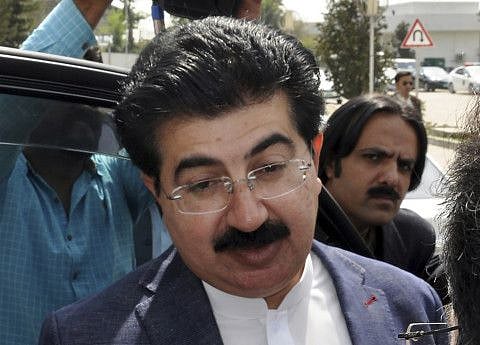Opposition unity in Pakistan is a mirage
Opposition parties must undertake a long overdue introspection on its own track record

It has been a week of unprecedented disaster for Pakistan’s Opposition parties following their failure to remove the chairman of the upper house of parliament — the Senate.
The move was widely hailed as a crucial first step to ‘democratise’ a supposedly ‘undemocratic’ Pakistan. And yet, the initiative amid much fanfare not only came crashing down. It also exposed the hollow credentials of the opposition parties in leading Pakistan towards a politically more representative country. Sadiq Sanjrani, chairman of the Senate and an ally of the government, survived an opposition-led vote of ‘no confidence’ — though by a thin margin.
Exactly what happened behind the scenes that simply crumbled the Opposition’s majority in the senate remains a matter of debate, discussion and widespread speculation. Given Pakistan’s political history, it's possible that some powers prevailed in defeating the motion against the chairman.
But the Opposition must also be made accountable for its own record in the past year, mostly spent in building pressure on Prime Minister Imran Khan who was elected in 2018. That election marked the first time ever that Pakistan successfully opted for a third party, setting aside the two parties that have ruled the country. Beyond shaming Imran on still unproven charges of flaws in the last elections, the Opposition has done little to focus on real life issues.
While tough economic conditions tied to a recent loan from the International Monetary Fund, or IMF, have been at the centre of the Opposition’s ire, little has been presented by way of policy alternatives. Sweeping statements which have claimed that the Opposition could lift Pakistan from its many economic challenges remain largely unconvincing.
Pakistan’s economic history easily shows the unending slide in yesteryears that has taken the country to its present turmoil. During the government of former prime minister Nawaz Sharif, Pakistan’s exports crashed and there was a reckless build up of debt including on largely ill-conceived initiatives. The economic tsar during the time, former finance minister Ishaq Dar now wanted in connection with money-laundering investigations, conveniently arrived in London for a de facto exile before he could be brought to justice. Before Sharif’s tenure, Pakistan was led by former president Asif Ali Zardari and his Pakistan People’s Party, or PPP. Though the regime came to power on the back of a sympathy wave following the tragic assassination of its leader Benazir Bhutto in December 2007, its goodwill was quickly squandered. Today, Zardari appears from time of time on Pakistan’s TV screens when he is summoned by Pakistan’s top anti-corruption authority to answer graft related charges.
Beyond this very sorry history, the past year culminating in the past week has clearly demonstrated the failed ability of the Opposition to join together in presenting an alternative policy framework for the future. Repeatedly intensifying attacks on Imran on the pain inflicted on Pakistanis through increasingly unpalatable economic measures, may well present appealing sound bytes. But attacking the government to seek fresh elections without the promise of a future surrounded by long overdue reforms, is hardly going to serve Pakistan’s best interests. For the moment widespread public lethargy and disinterest in the Opposition’s message clearly says it all. While ongoing belt tightening measures have indeed triggered resentment on the streets of Pakistan, there are few signs just yet of the public coming together to be led by the Opposition parties.
That disconnect between public sentiment and the Opposition has all to do with the sorry past. Popular memories across Pakistan still remain fresh from years gone by as the country battled increasing unemployment coupled with excessive electricity and gas shortages. Going forward, times may still be hard for the average household but mainstream Pakistanis have nothing to grapple with in terms of past memories of stability and improving outlook for the country.
Also Read
Pakistan faces a host of challengesImran Khan’s reform must not target political opponentsPakistan needs to honour its iconsLaying the course for Pakistan’s futureIt is time for the Opposition parties to undertake a very long overdue introspection on its own track record and ability to lead the country towards greater prosperity. For now, the Opposition has shown little interest in the government’s bid to forge a consensus on economic policies. That posturing may fuel an ongoing hostile message against Imran. But it certainly will not lift the Opposition’s credentials that leave much to be desired.
For Imran too, Sanjrani’s survival this week must not be reason for complacency. As the government oversees what will likely be a future period of unprecedented pain in Pakistan’s economic history, there will be a constant need to review policies and the way they are being conducted in real life. Some of the reported conditions that Imran’s government has agreed with the IMF appear to have been conceded without an apparent discussion with key stakeholders across the country. A pushback is therefore set to be the likely outcome.
Notwithstanding gaps in the government’s own house however, this week must be seen as an empowering moment for Imran and his team. The all too visible egg on the face of Pakistan’s Opposition parties has been quickly followed by promises of further defiance from the parties. But seeking to build anti-government pressure on the streets of Pakistan, for now remains a futile venture barring unexpected trends. For key opposition leaders notably Sharif and Zardari, undertaking a long overdue review of their past and future will be far more productive than setting the stage for another futile battle. That could be the best outcome of this week’s ill advised push that eventually came crashing down.
Farhan Bokhari is a Pakistan-based commentator who writes on political and economic matters.
Sign up for the Daily Briefing
Get the latest news and updates straight to your inbox
Network Links
GN StoreDownload our app
© Al Nisr Publishing LLC 2026. All rights reserved.